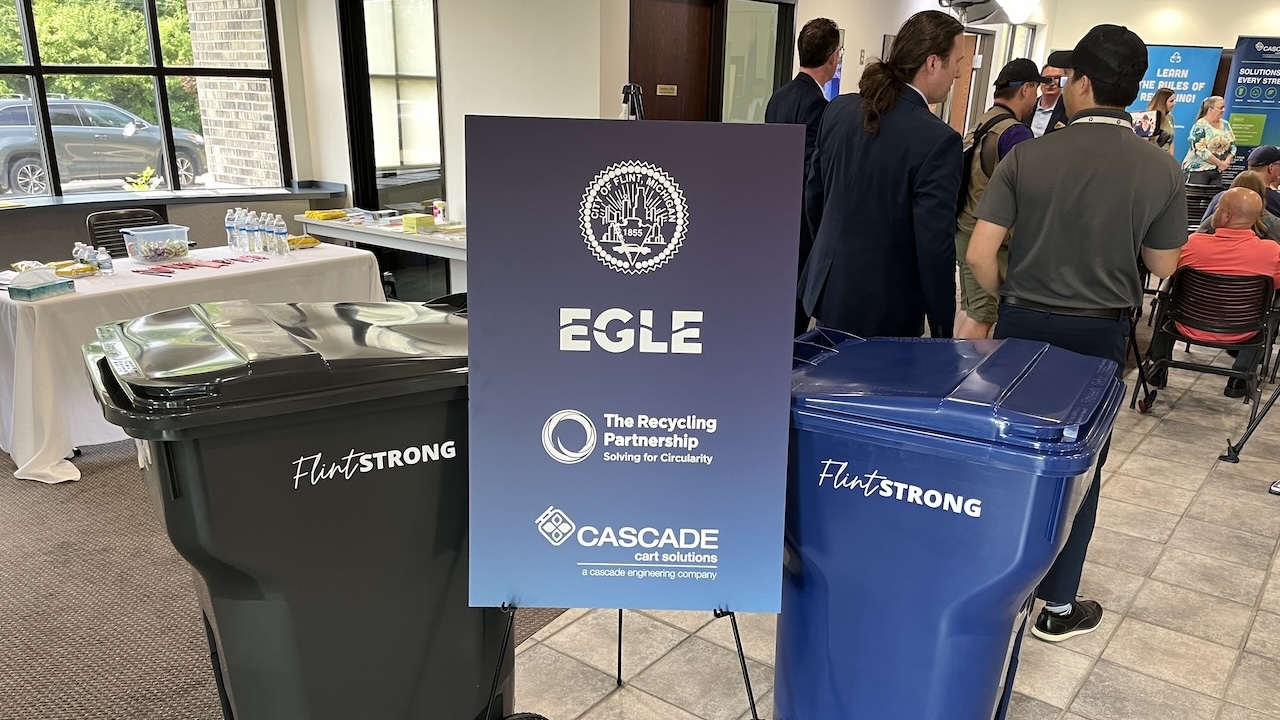FLINT, Mich. – Flint Mayor Sheldon Neeley today joined with Genesee County state legislators and leaders with the Michigan Dept. of Environment, Great Lakes, and Energy (EGLE) and national nonprofit The Recycling Partnership to announce the city has selected Grand Rapids-based Cascade Engineering to produce 60,000-plus 96-gallon trash carts and 64-gallon recycling carts that will be distributed for free beginning this fall to 30,000 residential households.
“Today’s announcement is the next step in transitioning Flint to a cart-based recycling program that will promote the largest recycling push in our city’s history,” Mayor Neeley said during a press conference at the Flint Service Center where models of the city’s new dark gray trash containers and blue recycling receptacles adorned with “Flint Strong” logos were on display.
Attending the event with the mayor was state Sen. John Cherry Jr. (D-Flint), state Rep. Cynthia Neeley (D-Flint), Cascade Engineering Sales Manager Brian Miller, Michigan Environmental Justice Public Advocate Regina Strong, The Recycling Partnership Vice President of Grants and Community Development Rob Taylor, and Flint recycling citizen-advocates Renee Harvey and Emily Stetson.
Flint currently requires residents to provide their own trash and recycling receptacles to contain materials at the curbside.
The approximately 60,000 new rolling, lidded recycling carts Cascade is producing for distribution this fall are projected to increase the amount of materials recycled in Flint from 624 tons per year to 5,400 tons per year – a 750% increase – as well as improve recycling access, inspire more resident participation and enhance safety for sanitation workers.
Benefits of the new carts cited by Mayor Neeley include:
- Carts will help sustain or even lower collection costs over time relative to an un-carted program.
- Carts reduce litter, help control rodent and pest populations, and enhance community cleanliness.
- Carts make recycling and garbage service easier for Flint residents
“This is a truly historic achievement for the City of Flint,” Sen. Cherry said. “We all know recycling helps us keep Michigan beautiful. Now, the City of Flint gets to be a larger part of that beautiful story.
“Many conscientious people in Flint have done their best to recycle, but most of the city’s potentially recyclable materials end up in trash containers and go to the landfill because Flint residents don’t have their own recycling containers,” Cherry said. “This campaign we’re announcing today now allows all Flint residents to do their part. Recycling is not only the right thing to do, but the smart thing to do.”
The Flint cart campaign rollout features multiple funding sources. The city is receiving a $1 million EGLE grant to help the city purchase and provide the free recycling carts.
“Expanding and modernizing Flint’s recycling infrastructure is a key goal of EGLE and the State of Michigan,” Strong said. “Our department’s $1 million EGLE grant is an investment in the City of Flint that will help all residents across the city have convenient and equitable access to recycling opportunities.”
In addition, together with its partners including Midland-based Dow Inc., The Recycling Partnership, a purpose-driven organization, is mobilizing voluntary investment to support communities like Flint in modernizing their programs and expanding access to recycling.
The Partnership’s $3.3 million grant to Flint is one of nearly 400 programs and facilities the organization has granted over the past decade. Through national nonprofit The Recycling Partnership, Dow is donating 1.2 million pounds of plastic resin to help manufacture the roughly 70,000 new household waste and recycling carts coming to Flint this fall, which Cascade will manufacture according to national best practices to ensure durability for 10 or more years.
By transitioning to cart-based collection, the City of Flint will be adopting an industry-recognized best management practice that will set up the city for immediate and long-term success.
Of the 821 cities in the U.S. with populations over 50,000 people, 78% are carted. The majority of programs are carted because it is the most efficient and cost-effective way to collect waste and recycling at the curb. Deploying city-owned waste and recycling carts will help keep Flint’s operational costs manageable in the near term and for years to come.
“Flint’s new recycling campaign starting this fall is like going from a horse and buggy to a spaceship in terms of improvement,” Rep. Neeley said.
“We know Flint residents and all Michiganders want to recycle the right way,” Rep. Neeley said. “Through Flint’s education campaign that kicks off this fall and recycling infrastructure investments by EGLE and others, we are providing them with the tools to do just that.”
Cities across Michigan and the entire U.S. have moved to lidded carts for garbage and recycling because manual collection has become increasingly dangerous and expensive. Prominent national and regional haulers have recently stated they will no longer bid on municipal contracts that are not carted.
“The Recycling Partnership is honored to be part of Flint’s citywide recycling transition alongside Michigan EGLE and the City of Flint,” The Partnership’s Taylor said. “We remain fully committed as a partner and resource to the city and state of Michigan to deliver a better recycling system.”
The Recycling Partnership has provided cart grants to local governments since 2014, working with communities as small as 400 homes to cities as large as 200,000 households. The Partnership has teamed with EGLE to deploy recycling carts in more than 30 communities across Michigan. Together, these efforts have placed 245,000 recycling carts into service in communities serving a combined population of over 1 million Michiganders.
As a woman-owned company and the only Michigan-based recycling and trash cart container manufacturer, Cascade has rolled out over 40 million trash and recycling containers nationwide, including over 4 million receptacles in the State of Michigan.
“Cascade is excited to be a small part of the City of Flint’s curbside trash and recycling upgrades,” Miller said. “Roll carts have a life cycle of 10-20 years or more,” Miller added, “and these new carts will be a part of the Flint community for decades to come, contributing to blight control around the city as well as contributing to the State of Michigan’s recycling goals well into the future.”

